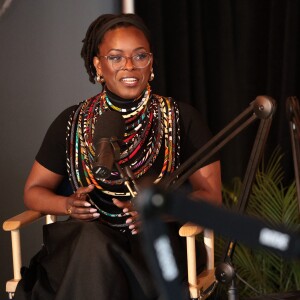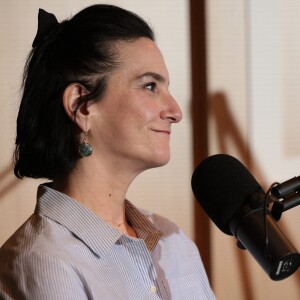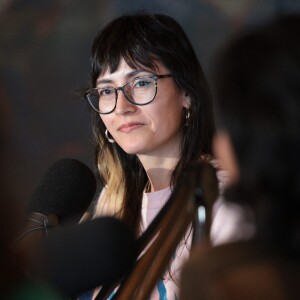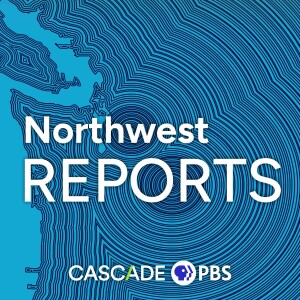Northwest Reports
Northwest Reports takes listeners deep into the stories that shape Seattle, Washington state, and the Pacific Northwest, drawing on the enterprising work being done by reporters in the Cascade PBS newsroom. Through conversations with journalists, community members and newsmakers, we showcase personal stories that help us better understand the real-life impacts behind the headlines. Hosted by Maleeha Syed and Sara Bernard.
Episodes

Wednesday Jun 25, 2025
Wednesday Jun 25, 2025
The founder and editor of 'The Needling' on why Seattle is so easy to make fun of and how comedy can help us process the news.
Seattle’s high cost of living, policing and tech industry fuel a lot of local headlines, including those published by The Needling, “Seattle’s Only Real Fake News.”
On May 31, the Northwest Reports team invited four local changemakers to the Cascade PBS Ideas Festival and asked them to speak candidly about their opinions on Seattle. The guests took the stage to both celebrate and throw a little shade at a flawed city that they still love.
The fourth and final episode of Northwest Reports Live features Lex Vaughn, the founder and editor-in-chief of The Needling, often referred to as Seattle’s version of The Onion.
In this episode, Vaughn talks about why Seattle is so easy to poke fun at; shares the Needling headlines that have gotten the biggest reactions over the years; and explores the ways humor can help us process what’s happening in the news.
---Credits
Producers: Maleeha Syed, Sara Bernard
Story editor: Ryan Famuliner
Executive producer: Sarah Menzies
Production Manager: Adam Brown
Production Engineer: Resti Bagcal
---
Northwest Reports is made possible by listeners like you. If you would like to join the members who help us create this series, go to cascadepbs.org/nwreports. In addition to supporting our journalism, members receive great member benefits, including Cascade PBS Passport, with extended access to an on-demand library of local and PBS favorites.

Wednesday Jun 25, 2025
Wednesday Jun 25, 2025
The founder of Hey, Black Seattle! talks about the good — and complicated — realities of building community in the PNW as a person of color.
It can be tough to find a sense of community in Seattle, where it’s rainy most of the year and there’s a notorious social freeze to break through. It can be even harder navigating those barriers if you’re not white.
In the third episode of Northwest Reports Live, which showcases conversations with Seattle changemakers at the Cascade PBS Ideas Festival, Kiesha B. Free talked about the good — and complicated — realities of living here.
Free is a speaker, facilitator, emcee, stand-up comedian and former business leader at Time and Microsoft. She also founded Hey, Black Seattle!, an online resource and movement that she created to connect and nurture Seattle’s Black community.
Free shares why she started Hey, Black Seattle!; addresses the myth that there are no Black people here; and weighs in on whether the city’s progressive reputation is well-earned.
---Credits
Producers: Maleeha Syed, Sara Bernard
Story editor: Ryan Famuliner
Executive producer: Sarah Menzies
Production Manager: Adam Brown
Production Engineer: Resti Bagcal
---
Northwest Reports is made possible by listeners like you. If you would like to join the members who help us create this series, go to cascadepbs.org/nwreports. In addition to supporting our journalism, members receive great member benefits, including Cascade PBS Passport, with extended access to an on-demand library of local and PBS favorites.

Wednesday Jun 25, 2025
Wednesday Jun 25, 2025
The creator of “View from the Floor” describes how people’s experiences in the Emerald City differ depending on their physical abilities.
Seattle’s got a lot to offer, whether you’re drawn to the city for its picturesque views or its rich cultural history. But people’s experiences of the Emerald City can vary a lot.
The guest in this episode of Northwest Reports Live, recorded at the Cascade PBS Ideas Festival on May 31, is Mindie Lind. She’s a local writer, musician, filmmaker and overall creative person who’s working on an animated feature film about “sex, drugs and rock ’n’ roll without legs.”
Lind has also written about some unpleasant experiences she’s had in Seattle, specifically the inaccessible spaces she’s had to navigate as a person born without legs.
She addresses all of that and more in this episode which, fair warning, does include some explicit language.
---Credits
Producers: Maleeha Syed, Sara Bernard
Story editor: Ryan Famuliner
Executive producer: Sarah Menzies
Production Manager: Adam Brown
Production Engineer: Resti Bagcal
---
Northwest Reports is made possible by listeners like you. If you would like to join the members who help us create this series, go to cascadepbs.org/nwreports. In addition to supporting our journalism, members receive great member benefits, including Cascade PBS Passport, with extended access to an on-demand library of local and PBS favorites.

Wednesday Jun 25, 2025
Wednesday Jun 25, 2025
The founder of Vanishing Seattle, a digital archive documenting disappearing spaces, addresses loss and joy in a changing city.
It seems that everyone has an opinion about Seattle as the city grows, residents get priced out and businesses disappear.
In the latest Northwest Reports series, recorded live at the Cascade PBS Ideas Festival on May 31, Sara Bernard and Maleeha Syed asked influential community members to share their thoughts on the city. The four guests featured in this series have launched projects and used their platforms to cultivate community here. In these conversations for Northwest Reports Live, they talked about their lived experiences and pushed back on widely held beliefs about this place.
The guest for the first episode is Cynthia Brothers, who founded Vanishing Seattle, a media movement that documents the displacement and disappearance of institutions, businesses and cultures in the city.
Brothers addresses the narrative that Seattle’s best days are behind us; why a business shutting down means more than just the loss of that physical space; and how she still finds joy even as she watches a city that she loves change.
---Credits
Producers: Maleeha Syed, Sara Bernard
Story editor: Ryan Famuliner
Executive producer: Sarah Menzies
Production Manager: Adam Brown
Production Engineer: Resti Bagcal
---
Northwest Reports is made possible by listeners like you. If you would like to join the members who help us create this series, go to cascadepbs.org/nwreports. In addition to supporting our journalism, members receive great member benefits, including Cascade PBS Passport, with extended access to an on-demand library of local and PBS favorites.

Wednesday Jun 11, 2025
Wednesday Jun 11, 2025
Despite ambitious goals toward combating climate change, Oregon and Washington lag far behind other states when it comes to adding renewable energy.
Our series It’s Not Easy Going Green focused on the struggles around the creation of new green energy projects. But it turns out that even if Oregon and Washington built all the wind and solar farms anyone could want, there’s just not enough grid capacity in the Northwest to deliver that energy to people’s homes.
That’s according to a new investigation from Oregon Public Broadcasting and ProPublica. OPB reporters Tony Schick and Monica Samayoa scrutinized the Northwest’s transmission grid and its operator, the Bonneville Power Administration, which in the past decade has hooked up only one wind or solar plant, and that was an add-on to an existing plant.
So, for a bonus episode of the series, Cascade PBS investigative reporter Brandon Block sat down with Schick and Samayoa to compare notes on why the Pacific Northwest’s dream of clean energy remains so far from reality.
Read Schick and Samayoa’s reporting, “How the Pacific Northwest’s Dream of Green Energy Fell Apart” and “Higher Prices, Rolling Blackouts,” at OPB.org or ProPublica.org.
---Credits
Producers: Maleeha Syed, Sara Bernard
Reporter: Brandon Block
Story editor: Ryan Famuliner
Executive producer: Sarah Menzies
---
Northwest Reports is made possible by listeners like you. If you would like to join the members who help us create this series, go to cascadepbs.org/nwreports. In addition to supporting our journalism, members receive great member benefits, including Cascade PBS Passport, with extended access to an on-demand library of local and PBS favorites.

Wednesday Mar 26, 2025
Wednesday Mar 26, 2025
One group with a loud voice in the debate over renewable energy development in Washington is farmers. Since so many of these conflicts are rooted in land-use decisions, a major question remains: Should the state prioritize land for agriculture or energy development?
Brandon Block explains how some farmers believe these new energy facilities could threaten their way of life, while others are surviving by leasing land to a solar developer.
Finally, Block speaks with a researcher who helps design conflict-reduction maps. The hope is that better advance planning can help address all of these dueling priorities – including the looming climate crisis.
Read Block's investigation here.
---Credits
Host/Producer: Maleeha Syed
Producer: Sara Bernard
Reporter: Brandon Block
Story editor: Ryan Famuliner
Executive producer: Sarah Menzies
---
Northwest Reports is made possible by listeners like you. If you would like to join the members who help us create this series, go to cascadepbs.org/nwreports. In addition to supporting our journalism, members receive great member benefits, including Cascade PBS Passport, with extended access to an on-demand library of local and PBS favorites.

Wednesday Mar 26, 2025
Wednesday Mar 26, 2025
What is the Energy Facility Site Evaluation Council, or EFSEC, anyway? While so many of Washington’s proposed renewable energy projects are mired in controversy, one thing all sides can agree on is their criticism of EFSEC.
The state body, which is empowered to override local laws and recommend permits for new energy projects, is routinely critiqued by everyone from clean energy developers to Indigenous nations to even the state legislature. Brandon Block explains why this facility-permitting council was created in the first place, how it works and what reforms might be in order.
Read Block's investigation here.
---Credits
Host/Producer: Maleeha Syed
Producer: Sara Bernard
Reporter: Brandon Block
Story editor: Ryan Famuliner
Executive producer: Sarah Menzies
---
Northwest Reports is made possible by listeners like you. If you would like to join the members who help us create this series, go to cascadepbs.org/nwreports. In addition to supporting our journalism, members receive great member benefits, including Cascade PBS Passport, with extended access to an on-demand library of local and PBS favorites.

Wednesday Mar 26, 2025
Wednesday Mar 26, 2025
As originally proposed, the Horse Heaven Hills wind farm would have built more than 200 wind turbines on a prominent ridgeline just south of Washington’s Tri-Cities. After years of community backlash, litigation and former Governor Inslee’s veto of a controversial state council’s permitting decision, the project is still in limbo.
Cascade PBS investigative reporter Brandon Block explains how a slew of resistance – including from homeowners, wildlife conservationists and the Yakama Nation – raises important questions about which concerns take precedence in the drive to kick fossil fuels.
Read Block's investigation here.
---Credits
Host/Producer: Maleeha Syed
Producer: Sara Bernard
Reporter: Brandon Block
Story editor: Ryan Famuliner
Executive producer: Sarah Menzies
---
Northwest Reports is made possible by listeners like you. If you would like to join the members who help us create this series, go to cascadepbs.org/nwreports. In addition to supporting our journalism, members receive great member benefits, including Cascade PBS Passport, with extended access to an on-demand library of local and PBS favorites.

Wednesday Dec 18, 2024
Wednesday Dec 18, 2024
In the final episode of the series, three Washington Republicans react to Donald Trump’s reelection and ponder the future of the state’s GOP.
Donald Trump’s reelection to the country’s highest office elicited a range of reactions ... even among Republicans in Washington state.
Some on the right have distanced themselves from Trump, which listeners heard in the first episode of “The Elephant in the Room” — a three-part series from Northwest Reports that dives deeper into the state and future of Washington’s GOP. Other Washington Republicans stand by the President-elect, including those whom the Northwest Reports team spoke to at a GOP watch party on election night.
In the series’ third and final episode, hosts Sara Bernard and Maleeha Syed caught up with a few Republicans in Washington after Nov. 5 to hear their perspectives on how this year’s election played out.
The three candidly shared their thoughts on Trump’s reelection, the reasons Republicans keep losing in Washington and where they see the state GOP going from here.
---
Credits
Host/Producer: Sara Bernard and Maleeha Syed
Reporters: Sara Bernard and Maleeha Syed
Story editor: Ryan Famuliner
Executive producer: Sarah Menzies
---
If you would like to support Cascade PBS, go to cascadepbs.org/membership. In addition to supporting our events and daily journalism, members receive complete access to the on-demand programming of Cascade PBS.

Wednesday Dec 11, 2024
Wednesday Dec 11, 2024
Follow the team as they head to Bellevue for a Republican election night watch party. As results roll in, attendees share their thoughts.
Washington state, as expected, went blue in this year’s election – showing up for Kamala Harris and electing Democrats in statewide races. Still, Republicans here had a lot of enthusiasm on election night ... and it turned out to be warranted.
The GOP clinched major victories on the national stage, reelecting Donald Trump to the executive office and securing control of both chambers of Congress.
In the second episode of “The Elephant in the Room” – a three-part series exploring the state of Washington’s Republican party – Northwest Reports spent election night at a GOP watch party in Bellevue.
As results rolled in, attendees shared their thoughts on what draws them to the Republican Party; their perspectives on the chaos that unfolded at the 2024 Washington GOP convention in Spokane; and, of course, their feelings about Donald Trump.
---
Credits
Host/Producer: Sara Bernard and Maleeha Syed
Reporters: Sara Bernard and Maleeha Syed
Story editor: Ryan Famuliner
Executive producer: Sarah Menzies
---
If you would like to support Cascade PBS, go to cascadepbs.org/membership. In addition to supporting our events and daily journalism, members receive complete access to the on-demand programming of Cascade PBS.






